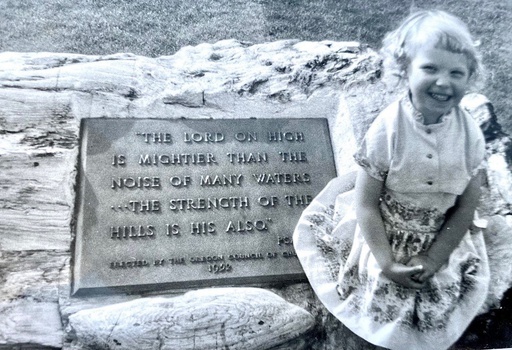Randy Alcorn's Blog, page 55
May 9, 2022
Suffering Is No Accident


 I write this on the one-month anniversary of Nanci’s homegoing. Strange to think that our true home is a place we’ve never been. Paul said, “I desire to depart and be with Christ, which is better by far” (Philippians 1:23). Yet our eternal home will be on the New Earth where “no longer will there be any curse” and “The throne of God and of the Lamb will be in the city, and his servants will serve him” (Revelation 22:3).
I write this on the one-month anniversary of Nanci’s homegoing. Strange to think that our true home is a place we’ve never been. Paul said, “I desire to depart and be with Christ, which is better by far” (Philippians 1:23). Yet our eternal home will be on the New Earth where “no longer will there be any curse” and “The throne of God and of the Lamb will be in the city, and his servants will serve him” (Revelation 22:3).
Nanci was my beloved wife for 47 years and my best friend for 54 (we met at age 14 and never dated anyone else since). I recently shared this with a group of men online (it applies to both husbands and wives):
Brothers, cling to your wife, and don’t let a day go by without telling her how much you love her and thank God for her. By God’s grace, I can honestly say I don’t look back at my marriage with regrets. Like all husbands, I have a stupid gene, and I said my share of stupid things. But I also repented, often asked Nanci’s forgiveness, and had the privilege of becoming her primary caregiver, keeping my vows “for better or for worse” and “till death do us part.”
In her journal, Nanci shared these insights:
Serving God in our suffering is not an assignment given to us by God; it is the natural outcome of the level of trust which has been supernaturally infused into us by God through our study of God. Knowing God causes us to have the perspective which ignites our hearts and controls our actions. But we, in our complacent hearts, often fail to study God. We have other priorities. We don’t feel the need. Then when suffering/trials arise, we are ill-equipped to understand (and therefore not able to gain more understanding) of the good purposes God has for us in it all.
Faith is trust in what you have come to know as true. Faith is not instant. Faith comes from study. Faith comes from testing what you believe to be true.
As I share in today’s blog (from 90 Days of God’s Goodness), we owe it to God, ourselves, and those around us to prepare for suffering. Part of that preparation is choosing to allow suffering to drive us deeper into God’s love.
Come, O children, listen to me;
I will teach you the fear of the Lord.
What man is there who desires life
and loves many days, that he may see good?
Keep your tongue from evil
and your lips from speaking deceit.
Turn away from evil and do good;
seek peace and pursue it.
The eyes of the Lord are toward the righteous
and his ears toward their cry.
The face of the Lord is against those who do evil,
to cut off the memory of them from the earth.
When the righteous cry for help, the Lord hears
and delivers them out of all their troubles.
The Lord is near to the brokenhearted
and saves the crushed in spirit.
Many are the afflictions of the righteous,
but the Lord delivers him out of them all.
—Psalm 34:11–19, ESV
Many believe that suffering is never God’s will. But this Scripture tells us that it often is. And these verses affirm God’s faithfulness even as we suffer.
A young woman battling cancer wrote me, “I was surprised that when it happened, it was hard and it hurt and I was sad and I couldn’t find anything good or redeeming about my losses. I never expected that a Christian who had access to God could feel so empty and alone.”
Unfortunately, most of us don’t give focused thought to evil and suffering until we experience them. This forces us to formulate perspective on the fly, at a time when our thinking is muddled, and we’re exhausted and consumed by pressing issues. If you’ve been there, you’ll attest to the fact that it’s far better to think through suffering in advance.
Pastor James Montgomery Boice had a clear perspective. In May 2000, he stood before his Philadelphia church and explained that he’d been diagnosed with liver cancer:
Should you pray for a miracle? Well, you’re free to do that, of course. My general impression is that the God who is able to do miracles—and He certainly can—is also able to keep you from getting the problem in the first place. So although miracles do happen, they’re rare by definition.… Above all, I would say pray for the glory of God. If you think of God glorifying Himself in history and you say, where in all of history has God most glorified Himself? He did it at the cross of Jesus Christ, and it wasn’t by delivering Jesus from the cross, though He could have.…
God is in charge. When things like this come into our lives, they are not accidental. It’s not as if God somehow forgot what was going on, and something bad slipped by.… God is not only the one who is in charge; God is also good. Everything He does is good.… If God does something in your life, would you change it? If you’d change it, you’d make it worse. It wouldn’t be as good.
Eight weeks later, having taught his people first how to live and then how to die, Pastor Boice departed this world to “be with Christ, which is better by far” (Philippians 1:23).
Suffering will come; we owe it to God, ourselves, and those around us to prepare for it.
Lord, as I and those I love face hardship and suffering, give me that same sense of your grace and purpose that Pastor Boice enjoyed. Remind me that for those who bow their knees to you in repentance and faith, our present suffering will be replaced by the eternal pleasures of your presence, where joy will be the air we breathe.
Photo by Austin Schmid on Unsplash
May 6, 2022
Sorrow’s End

 Contemplating the final end of sorrow has brought me great comfort in my first month of grief after my precious wife’s death. I already can’t wait to see Nanci again and have her show me around Heaven, and then after the resurrection when we relocate to the New Earth, for us to both experience it for the first time together. How glorious that will be, and above all just to be with Jesus regardless of where!
Contemplating the final end of sorrow has brought me great comfort in my first month of grief after my precious wife’s death. I already can’t wait to see Nanci again and have her show me around Heaven, and then after the resurrection when we relocate to the New Earth, for us to both experience it for the first time together. How glorious that will be, and above all just to be with Jesus regardless of where!
I sometimes ask Jesus to pass on messages to Nanci as I have asked Him to do for my mother since 1981 when she joined Him there. As I shared in a past blog, of course, we shouldn’t pray to the saints who are with Jesus, or try to talk to them directly, but we can always pray to Jesus, our only Mediator (1 Timothy 2:5), and He can tell our loved ones living in His presence whatever He wants to. He still hears our prayers, and I think there’s every reason to believe that He would pass on to Nanci something I ask Him to.
These are two paintings that Nanci loved, putting up printouts of them in her office. She saw herself as the girl in both photos, with King Aslan the lion in the one, and with the real King Jesus who Aslan depicts in the other.

Above the blond girl embraced by Jesus, my blond wife wrote “Someday.” And at last that day she longed for has come.
Then I saw a new heaven and a new earth, for the first heaven and the first earth had passed away, and there was no longer any sea. I saw the Holy City, the new Jerusalem, coming down out of heaven from God, prepared as a bride beautifully dressed for her husband. And I heard a loud voice from the throne saying, “Now the dwelling of God is with men, and he will live with them. They will be his people, and God himself will be with them and be their God. He will wipe every tear from their eyes. There will be no more death or mourning or crying or pain, for the old order of things has passed away.”
He who was seated on the throne said, “I am making everything new!” Then he said, “Write this down, for these words are trustworthy and true.”
—Revelation 21:1–5
I write in 90 Days of God’s Goodness:
God promises that one day there will be no more death or mourning or crying or pain. As we are acutely aware, that day has not yet come. But notice how Jesus caps off His promise to His disciple John: He says John should write the words down because they are “trustworthy and true.” In other words, He is saying, “John, my beloved friend and servant, you can take these words to the bank; I’ll stake my life on them. In fact, I already have.”
Christ promises—in writing—a resurrected life on the New Earth, an eternal life without sorrow and pain in a glorious new world. Talk about light at the end of the tunnel!
Our own suffering is often our wake-up call to the world’s suffering. But even if you aren’t now facing it, look around and you’ll see many who are. If we open our eyes, we’ll see the problem of evil and suffering even when it doesn’t touch us directly.
The loss of American lives in the terrorist attacks of September 11, 2001, numbered 2,973—horrible indeed, yet a small fraction of the terror and loss of life faced daily around the world. The death toll in the 1994 Rwandan genocide, for example, amounted to more than two World Trade Center disasters every day for one hundred days straight. Americans discovered in one day what much of the world already knew—violent death comes quickly, hits hard, and can be unspeakably appalling.
Yet no suffering is like our own suffering. After his wife died, a grief-torn C. S. Lewis realized and wrote in A Grief Observed, “If I had really cared, as I thought I did, about the sorrows of the world, I should not have been so overwhelmed when my own sorrow came.”
Sufferers have told me, “We did everything right. We attended church and gave our money to missions—and then God did this to us. I don’t get it.” At times like these our faith gets exposed as an insurance policy for which our good behavior is the premium we pay to protect us from harm.
Devastation and tragedy feel just as real for those with faith as they do for those who have none. But knowledge that others have suffered and learned to trust God anyway gives the faithful strength to keep going. Because they do not place their hope for health and abundance and secure relationships in this life but in an eternal life to come, believers’ hope remains firm regardless of what happens.
And on the other side of death, God promises that all who know Him will experience acceptance into His holy, loving, and gracious arms—which is the greatest miracle, the answer to the problem of evil and suffering. He promises us an eternal kingdom on the New Earth, where He will wipe away every tear from the eyes of those who come to trust Him in this present and temporary world of pain.
Lord, thank you for your promise of a new and glorious and everlasting life on a redeemed Earth, with you and all of my spiritual family. Help me to trust you today, to sense your arms around me and your gentle hands even now beginning to wipe away my tears.
Photo by FRANCESCO TOMMASINI on Unsplash
May 4, 2022
Honest Faith Can Cry out to God

 As I shared recently with a friend, it’s a new world I’m living in without Nanci. I miss the old one. The house is profoundly changed by Nanci’s absence. Not hearing her laugh is maybe the hardest part. But I’m sure looking forward to the great reunion, and eternal life with Jesus in a far better world. And to hear her laugh, louder and more vibrant than ever! Here’s a tiny sample of that laugh:
As I shared recently with a friend, it’s a new world I’m living in without Nanci. I miss the old one. The house is profoundly changed by Nanci’s absence. Not hearing her laugh is maybe the hardest part. But I’m sure looking forward to the great reunion, and eternal life with Jesus in a far better world. And to hear her laugh, louder and more vibrant than ever! Here’s a tiny sample of that laugh:
One of the many quotes that Nanci included in her journals was this one from our precious friend Joni Eareckson Tada:
It is when your soul has been blasted bare, when you feel raw and undone, that you can be bonded to the Savior. And then you not only meet suffering on God’s terms, but you meet joy on God’s terms. You cry out to God and He gets your heart pumping for heaven. He injects his peace, power, and perspective into your spiritual being. He imparts a new way of looking at your hardships. He puts a song in your heart.
Scripture models this crying out to God:
My God, my God, why have You forsaken me?
Far from my deliverance are the words of my groaning.
O my God, I cry by day, but You do not answer;
And by night, but I have no rest.
Yet You are holy,
O You who are enthroned upon the praises of Israel.
In You our fathers trusted;
They trusted and You delivered them.
To You they cried out and were delivered;
In You they trusted and were not disappointed.
—Psalm 22:1–5, NASB
Here’s what I wrote in my book 90 Days of God’s Goodness:
What an honest cry to God for help: “Why, God? Why does it seem like you’re not answering my prayers?” As he wrestles with this, David turns to Scripture, where God’s deliverance of His people is documented. David reflects on their trust in God. In the end, God’s faithfulness to Israel inspires David to believe that God will prove faithful to him as well.
God’s Word contains countless expressions of concern and anguish about the hard times people experience and the fact that they sometimes don’t feel God’s closeness. In this fallen world, “Why?” is a common question.
Randy Butler, a pastor, told me about his teenage son’s death. “For twenty years, God gave me a perfect life, family, and ministry. Then Kevin died, and nearly every morning, for three or four months, I screamed questions at God. I asked, ‘What were you thinking?’ And, ‘Is this the best you can do for me?’ And finally, ‘Do you really expect me to show up every Sunday and tell everyone how great you are?’ In the silence I began to hear the voice of God…then, without any announcement, when I became silent, God spoke to my soul. He had an answer for each of my three questions.”
Had Randy not been unreservedly honest with God, he couldn’t have completely grasped how the God he spoke to had watched His own Son die long before Randy had. God the Father had endured the horrible death of Jesus, His only Son. So, better than anyone in the universe, God empathized with Randy’s pain.
A lot of bad theology inevitably surfaces when we face suffering. When people lose their faith because of suffering, it suggests a weak or nominal faith that didn’t account for or prepare them for evil and suffering. Any faith not based on the truth needs to be lost—the sooner, the better.
Suffering and evil exert a force that either pushes us away from God or pulls us toward Him. But if personal suffering gives sufficient evidence that God doesn’t exist, then surely I shouldn’t wait until I suffer to conclude He’s a myth. If my suffering would one day justify denying God, then I should deny Him now in light of other people’s suffering.
Believing that God exists is not the same as trusting the God who exists. A nominal Christian often discovers in suffering that his faith has been in his church, family, career, or social network, but not Christ. As he faces evil and suffering, he may find his beliefs shaken or even destroyed. But genuine faith—trusting God even when we don’t understand—will be made stronger and purer.
If your faith is based on lack of affliction, it’s on the brink of extinction and is only a frightening diagnosis or a shattering phone call away from collapse. Token faith will not survive suffering. Nor should it.
Thank you, Lord, for welcoming the honest cries of our hearts. Thank you for allowing us to ask, “Why?” It’s a gift to us that your prophets and King David asked, “Why,” and even your Son, Jesus, asked, “Why?” as he hung on a cross. But give us the grace and wisdom, Lord, to ask our questions while looking to your Word and to your Holy Spirit for answers.
Photo by Nathan Dumlao on Unsplash
May 2, 2022
Freedom and Comfort in Truth

 As Nanci dealt with suffering and faced her death, I saw greater joy and more profound happiness in her than ever before. She had been happy in Jesus all our marriage, but great suffering is a big test. She didn’t merely pass it, she aced it. Sure, she had tough days where she longed for relief and release. But her light didn’t gradually go out; it shined brighter until the last week or so where it really did fade, as her eyes were looking at another world. A far better one.
As Nanci dealt with suffering and faced her death, I saw greater joy and more profound happiness in her than ever before. She had been happy in Jesus all our marriage, but great suffering is a big test. She didn’t merely pass it, she aced it. Sure, she had tough days where she longed for relief and release. But her light didn’t gradually go out; it shined brighter until the last week or so where it really did fade, as her eyes were looking at another world. A far better one.
In October 2018, Nanci wrote in her journal that she was “above all, eternally thankful for the incredible growth in my heart spiritually. I honestly would not trade this cancer experience to go back to where I was—which wasn’t bad. I believed and experienced God’s hand on my life before cancer. But these last months have been used by God to propel me into a deeper understanding and experience of His sovereignty, wisdom, steadfast love, mercy, grace, faithfulness, immanency, and trustworthiness and omnipotence.”
Nanci’s journals have so much Scripture and so much Charles Spurgeon woven into them, way more than personal details of her battle with cancer. In her own words, she expresses the depth of her trust in the love and sovereignty of God. She is a wonderful example of seeking comfort and perspective in God’s solid truth, just like I talk about in today’s blog, excerpted from 90 Days of God’s Goodness:
I am laid low in the dust;
preserve my life according to your word.
I recounted my ways and you answered me;
teach me your decrees.
Let me understand the teaching of your precepts;
then I will meditate on your wonders.
My soul is weary with sorrow;
strengthen me according to your word.
Keep me from deceitful ways;
be gracious to me through your law.
I have chosen the way of truth;
I have set my heart on your laws.
I hold fast to your statutes, O Lord;
do not let me be put to shame.
I run in the path of your commands,
for you have set my heart free.
—Psalm 119:25–32
Don’t you love the heartfelt honesty of the words God has chosen to include in the Bible? “My soul is weary with sorrow.” It’s the burden of life in a hurting world that causes the writer to turn to Scripture for strength: “Preserve my life according to your word.… Strengthen me according to your word.”
If abuse, rape, desertion, paralysis, debilitating disease, or the loss of a loved one has devastated you, then the issue of evil and suffering isn’t merely theoretical, philosophical, or theological. It’s deeply personal. Logical arguments won’t satisfy you; in fact, they might offend you. You need help with the emotional problem of evil, not merely the logical problem of evil. Like children at times, each of us must snuggle into our Father’s arms, and there receive the comfort we need.
But remember this: you are a whole person. Truth matters. To touch us at the heart level—and to keep touching us over days, months, years, and decades—truth must work its way into our minds.
Never seek comfort by ignoring truth. Comfort in falsehood is false comfort. Jesus said, “The truth will set you free” (John 8:32). When you try to soothe your feelings without bothering to think deeply about ideas, you are asking to be manipulated. Quick-fix feelings won’t sustain you over the long haul. On the other hand, deeply rooted beliefs—specifically a worldview grounded in Scripture—will allow you to persevere and hold on to a faith built on the solid rock of God’s truth.
In writing His magnificent story of redemption, God has revealed truths about Himself, us, the world, goodness, evil, suffering, and Heaven and Hell. (I capitalize those terms as proper nouns because they are actual places, like New England or Saturn.) Those truths God reveals to us teem with life. The blood of man and God flows through them. God speaks with passion, not indifference; He utters fascinating words, not dull ones. To come to grips with the problem of evil and suffering, you must do more than hear heart-wrenching stories about suffering people. You must hear God’s truth to help you interpret those stories.
The Bible reveals Him to be a great God, sovereign and all-powerful, gracious and all-good, kind and all-wise. And He is also our Abba, our Papa. But we do not always feel warmth and security, do we?
Maybe you’re holding on to years of bitterness and depression. You blame someone for your suffering—and that someone may be God. You will not find relief until you gain perspective. That perspective can be found as you meditate on His wonders and ask Him to use the truths of His revealed Word to strengthen you.
Lord, at times my heart is heavy with sorrow. This fallen world isn’t an easy place to live in. You know because you descended from Heaven’s happiness and lived here, laughed here, suffered here, and were crucified here. Thank you for living as you did and dying as you did and rising as you did so I can live forever with you and your people in a world where you will, once and for all, make all things right.
Photo by Aaron Burden on Unsplash
April 29, 2022
A Happy Ending without an End

In light of Nanci’s departure to be with Jesus four weeks ago, a kind sister reached out to me, saying she was hoping and praying that I felt the closeness of Jesus. I told her that I do indeed sense His closeness. At the same time, grief and sometimes depression come upon me in waves. But they do not drive out Jesus or the Holy Spirit, both of whom indwell me (Romans 8:8-11). Nor can they separate me from God the Father. In fact, “Neither death, nor life, nor angels, nor principalities, nor powers, nor things present, nor things to come, Nor height, nor depth, nor any other creature, shall be able to separate us from the love of God, which is in Christ Jesus our Lord” (Romans 8:38-39).
I am not simply claiming these things to be true—I normally believe them to be true and often am very aware of their reality. I learned years ago, when dealing with depression, that God not only is with me right in the middle of it, but I can sometimes, even often, sense His presence. The promises of Jesus are not mere casual reassurances; rather, they are blood-bought, guaranteed by His proven character and love. I can bank on them 100%. So can you.
Somehow when my old companion Depression visits me, I know in a special way, my Savior has entered into my world, understands me, accepts and loves me, and says, “See, I have engraved you on the palms of my hands” (Isaiah 49:16). His engraving tools are the nails of a Carpenter.
It’s not that my grief and depression aren’t painful; it’s that my whole world, including all my weakness and shortcomings, is in His nail-scarred hands and under the governance of His grace. Why would I be surprised to suffer, when God promises us we will suffer? “Dear friends, don’t be surprised when the fiery ordeal comes among you to test you, as if something unusual were happening to you” (1 Peter 4:12). When you suffer don’t think, “God isn’t keeping His promises,” rather, think, “God is keeping His promise that I will suffer, and that He is right here with me in my suffering to accomplish His purposes for His glory and my good.”
This past nine days, depression has intermingled with grief. I feel profound pain of loss, but I simultaneously feel that the One who has borne my grief and carried my sorrows is infinitely larger than my pain. So as real as the pain is, I feel no despair, no loss of hope, no distance from Him. He is not only my sovereign Maker, He is also my living Redeemer and ever-present Friend who will never—no never—desert me or forsake me. As I weep, I have been thinking about the flood of His tears, for His mother when He was on the cross, for Jerusalem that said no to His comfort, for His friends Lazarus and Mary and Martha. I am so amazed by Him, so deeply grateful. It makes me sad to think that those I know and loved took their lives because they could not see God inside their depression, but only outside. No virtue in me accounts for my awareness of His closeness, but only a kindness of God’s grace that I do not take for granted for a moment. It is hard enough to bear being without my Nanci. I cannot imagine what it would be like to think I was without my Creator and Redeemer and dearest Friend.
One thing that’s brought me joy is going through old photos to pick out some for Nanci’s memorial service. What wonderful memories. While I miss Nanci terribly, I am overwhelmed with the goodness of God for giving me such a wife and for what we were able to experience together in this life. I can’t wait for what is ahead of us in the presence of Christ. Nanci got a head start on me! I look forward to seeing her again and starting to catch up. Together, we’ll enjoy that happy ending that will never end.
The following is from my book 90 Days of God’s Goodness:
Praise be to the God and Father of our Lord Jesus Christ! In his great mercy he has given us new birth into a living hope through the resurrection of Jesus Christ from the dead, and into an inheritance that can never perish, spoil or fade—kept in heaven for you, who through faith are shielded by God’s power until the coming of the salvation that is ready to be revealed in the last time. In this you greatly rejoice, though now for a little while you may have had to suffer grief in all kinds of trials. These have come so that your faith—of greater worth than gold, which perishes even though refined by fire—may be proved genuine and may result in praise, glory and honor when Jesus Christ is revealed. Though you have not seen him, you love him; and even though you do not see him now, you believe in him and are filled with an inexpressible and glorious joy, for you are receiving the goal of your faith, the salvation of your souls.
—1 Peter 1:3–9
We are to rejoice in our inheritance in Heaven even as God sovereignly uses difficulties in our lives as a fire to refine, purify, and strengthen our faith.
I’ll never forget my first thirty seconds of high school. I walked in the front door, tripped, and fell on my face…right in front of three cheerleaders. They laughed hysterically. Not a good start for a freshman desperately wanting to be cool!
At the time, that incident hurt worse than my serious ankle injury while playing football. Yet over forty years later, even though I still remember it vividly, it brings me absolutely no pain. It just makes me laugh. Of course, my teenage troubles do not compare to having cancer, being tortured, or seeing a child die. I only mean that although certain experiences brought me genuine pain when they happened, with the passing of time and gaining of perspective, they no longer do.
If we sometimes recognize this in daily life, shouldn’t we suppose that many of our most painful ordeals will look quite different a million years from now, as we recall them on the New Earth? What if one day we discover that God wasted nothing in our life on Earth? What if we see that every agony was part of giving birth to an eternal joy?
I watched an interview with two families whose daughters, students atTaylorUniversity, suffered a terrible car accident in 2006. A truck hit a van head-on, killing five people.
At the accident scene, someone found Laura Van Ryn’s purse next to Whitney Cerak. Workers at the scene mistook the students, both blondes, for each other. Laura, misidentified as Whitney, was pronounced dead at the scene, while Whitney, misidentified as Laura, fought for her life on the way to the hospital. Some fourteen hundred people attended “Whitney’s” funeral, and her father spoke at the service. No one suspected that the body they buried that day was Laura Van Ryn’s.
For five weeks, the Ceraks believed their daughter had died, while the Van Ryns thought their daughter lived.
When this monumental error finally came to light, both families expressed faith in God. In one conversation, the Ceraks told the Van Ryns, “We are so sorry that we have the happy ending.” Don Van Ryn responded, “We do too…we just haven’t seen it yet.”
The Van Ryns await their reunion with Laura in a better world.
God promises that the eternal ending will break forth in such glorious happiness that all present suffering will pale in comparison. All who know Jesus will have a happy ending.
We just haven’t seen it yet.
Thank you, Lord, for valuing our faith in you so much that you test and strengthen it through adversity. Thank you for your promise of an unfading inheritance and that you are developing greater Christlikeness in us now that we may be better prepared to rule under you in the eternal kingdom. Though we aren’t there yet, we celebrate the fact that because of your grace, we will have a happy ending; one that will never end.
April 27, 2022
Conflict with a Purpose

 It may seem strange to say this—I usually don’t look for comfort from my own books—but when I set out a copy of 90 Days of God’s Goodness for a friend in need, I wasal thinking about Nanci and palpably feeling her absence. So I picked up the nearest book even though I’d written it, and the next thing I knew God had really touched me through the first six entries. I’ll share them in a series of blogs over the next couple of weeks.
It may seem strange to say this—I usually don’t look for comfort from my own books—but when I set out a copy of 90 Days of God’s Goodness for a friend in need, I wasal thinking about Nanci and palpably feeling her absence. So I picked up the nearest book even though I’d written it, and the next thing I knew God had really touched me through the first six entries. I’ll share them in a series of blogs over the next couple of weeks.
Then Joseph said to his brothers, “Come close to me.” When they had done so, he said, “I am your brother Joseph, the one you sold intoEgypt! And now, do not be distressed and do not be angry with yourselves for selling me here, because it was to save lives that God sent me ahead of you. For two years now there has been famine in the land, and for the next five years there will not be plowing and reaping. But God sent me ahead of you to preserve for you a remnant on earth and to save your lives by a great deliverance.
“So then, it was not you who sent me here, but God. He made me father to Pharaoh, lord of his entire household and ruler of all Egypt.…
“You intended to harm me, but God intended it for good to accomplish what is now being done, the saving of many lives.”
—Genesis 45:4–8; 50:20
After Job had prayed for his friends, the Lord made him prosperous again and gave him twice as much as he had before. All his brothers and sisters and everyone who had known him before…comforted and consoled him over all the trouble the Lord had brought upon him.…
The Lord blessed the latter part of Job’s life more than the first.
—Job 42:10–12
While most of my books are nonfiction, I’ve written seven full-length novels. Now, if I were to write a novel about lives without conflict, where characters get everything they want, where life marches on comfortably and no one ever loses anything, nobody would read it. Who likes a boring story? In fact, my central characters always face great conflict, turmoil, uncertainty, and suffering. Some die. That it makes for a far better story is my main reason for doing this. (We enjoy in fiction much that we do not enjoy in life.)
So who am I to say that God shouldn’t write such things into His story, including my part?
In our lives God uses conflict not just to make the story better but to make us better. In life, not just literature, we repeatedly see that protection from conflict produces soft, spoiled, and selfish people, while enduring conflict is more likely to produce someone strong, capable, and caring.
If, in an interview with a character from one of my novels, you were to ask whether he’d like to be written out of the story, he would answer no. Nonexistence appeals to no one. Now ask him if he would like to suffer less, and he’ll answer yes. Who wouldn’t?
I empathize with my characters since I, too, am a character in God’s story. At times I’d love to take a break from the drama. Three months off without stress would feel nice. But I also realize I’m part of something great, far bigger than myself. And I trust God not only to bring the whole story together but also to do with my part of it what he knows to be best.
Given the option while facing his trials, I’m confident Joseph would have walked off the stage of God’s story. After betrayal by his brothers when he was a teenager and being sold into slavery and later falsely accused by Potiphar’s wife and sent to prison, Joseph had surely endured enough for one life!
Talk to Job in the middle of his story—with ten children dead and excruciating boils covering his body, God apparently abandoning him and friends haranguing him. Ask if he wants out. I know what he’d say because he said it: “Why did I not perish at birth?” (Job 3:11).
But that’s all over now. On the New Earth, sit by Job and Joseph at a lavish banquet with their Lord. Ask them, “Be honest. Was it really worth it?”
“Absolutely,” Job says. Joseph smiles, nodding emphatically.
“But, Job, had God given you the choice, wouldn’t you have walked out of the story?”
“In a heartbeat. I’m just glad he didn’t let me.”
You and I are characters in God’s story, handmade by Him. Every character serves a purpose. God loves a great story, and all of us who know Him will recall and celebrate and continue to live in that story for all eternity.
Before we fault Him for the plot twists we don’t like, we should remember that Jesus has written this story in His own blood.
Father, what a privilege to be chosen by you to be a character in the greatest story ever told—and to know that one day we’ll be able to read it start to finish. Thank you for this true, unfolding drama of redemption. Thank you that in the ages to come we will praise you for not letting us walk off the pages. Thank you for accomplishing the purposes in us that at first only you, the Author, understand, but in the end, looking back, we, the readers—and characters—will too.
April 25, 2022
Yes, Memorizing Scripture Is Possible, No Matter Your Age

Not long ago I shared this thought on Facebook:
When we copy Scripture and carry it with us throughout the day, reading it and memorizing it, we make God’s Word a part of us. As Paul said, “Let the word of Christ dwell in you richly” (Colossians 3:16).
We received some great responses about memorizing Scripture, and I’m sharing some of them here. I also appreciated the example of positive and encouraging interaction on social media:
Natalie: Yes! I was challenged to memorize the Book of James so I wrote it out and memorized it while walking dogs, walking on treadmill in winter and just wherever I was. I can say the whole thing although I have to practice, or I lose some of it. I'm 60 so age doesn't matter. God's Word is eternal.
Sandy: How many verses did you memorize at a time? Or did it vary? I’ve always wanted to do this with the Book of James…..and now I will.
Natalie: I just repeated the first section and then would add to it. The first chapter is long, so it took a while. Then I did the same with the second, always going back to the first also for a refresher. I've read that many Muslims memorize the Koran, which is very confusing and plagiarizes some Scripture, so we believers can certainly retain God's Word. The cool thing is in certain situations in my life, one of those verses will pop up inside to correct, teach, or assure me. You can do it!
Sandy: Thank you for these suggestions….and your encouragement!
Terry: I’m working on memorizing Romans 8. My beloved late husband memorized it in 2017 after he had a major stroke at the age of 70, in order to keep his brain active and mostly to give hope to his spirit. Our son read it at his funeral three years later in December 2020. I was motivated to memorize it also, as a memorial to him and because it makes me feel closer to him (and to the Lord of course!), since he’s with the Word in Person now! I’m on verse 22. It’s hard but I persevere, writing it out often. I figure if my beloved accomplished this after a terrible and debilitating stroke, I am without excuse. I’m 67 years “young” BTW )
I also know without a doubt that my dear husband left his family with a spiritual legacy more precious than fine gold. I’ve been able to use these verses often in ministering to others. And so, exponentially, Phil is continuing to reach people even though he is no longer present on this earth. It’s truly amazing! His works in life continue to bear fruit through his family. We surely do miss him and are looking forward to Heaven and the New Earth! (PS I work on this while at the gym as well. Folks must think I’m talking to myself )
Natalie: What a wonderful testimony of a life well lived of your husband and how, as you say, he is still bearing fruit. You are as well! Praise Him. I am also a widow as of 1-27-21 and I also rejoice in KNOWING my husband is with the Lord. He came to the Lord late, two and a half years before his death, but he grew so much in those few years. It was wonderful to see who God had made him to be rather than the lost soul he was before. We rejoice in life and in death because we are His. Blessings to you and your family and your memorization.
Terry: You know of course that now I am crying (which happens often these days ) I truly feel your pain as well as your joy that we “sorrow not as those who have no hope” because we will all meet and you and I will have our loved ones with us for all eternity. Perhaps our husbands are discussing us together as we speak, who knows?
For ideas to get you started, see You Can Memorize Scripture This Year.
Photo by Hannah Busing on Unsplash
April 22, 2022
The Surprise Blessing of Suffering and Trials

Note from Randy: I appreciated this article by Jeremy Linneman, lead pastor of Trinity Community Church in Columbia, Missouri. He shares several quotes from J. I. Packer’s Knowing God, a book God has used in my life profoundly. It is still one of my top five books of all time.
J. I. Packer on the Surprise Blessing of Trials
By Jeremy Linneman
I remember where I was when I read these words by the late theologian J. I. Packer: “A certain type of ministry of the gospel is cruel. It doesn’t mean to be, but it is.”
What is the cruel sort of ministry Packer had in mind? His answer would haunt me.
I was going through a particularly hard season of depression and had been suffering from chronic illness. It was a season of trial and discouragement that had lasted far too long—or so I thought. I’d prayed. I’d talked with wise counselors. I’d prayed more. But this difficult season was unrelenting, and my spirit wasn’t lifting.
Then my friend recommended Packer’s Knowing God. I’d read it before, but he pointed me to a chapter late in the book called “These Inward Trials.” I reopened the classic, found the chapter, and began to read. That very night, my whole mindset toward pain and suffering began to change. (Some lessons can’t be learned until we’re ready.)
Packer’s reflections on the cruel teaching and its wonderful antidote helped me make sense of my season of hardship.
These Inward Trials
So, what is this cruel sort of gospel ministry? According to Packer, the cruel teaching is that becoming a Christian makes your life easier. It’s the idea that being a believer decreases your sinning, enables you to find your truest self and deepest calling, equips you to change the world, and means less overall suffering. We could summarize this unbiblical teaching as: Your Best Life Now!
The lopsided impression “which pictures the normal Christian life as trouble-free,” Packer writes, “is bound to lead sooner or later to bitter disillusionment.”
If there’s a phrase that encapsulates the spiritual condition of 20- and 30-somethings I’ve ministered among for the past decade and a half, it’s bitter disillusionment.
In the words of Fight Club’s Tyler Durden, we’ve been lied to our entire lives. I’m thinking mostly of us millennials and Gen Zers raised in middle-class America: we were raised on a steady diet of self-esteem; we’ve been graded on a generous curve; we’ve been told if we pursue our dreams, anything is possible. “You are going to change the world.” And then we become adults and discover life is hard, we’re not all that special, and this world is a vicious place.
Dietrich Bonhoeffer called this the “wish-dream.” He wrote Life Together in German, and for lack of a better word, his original English translators came up with the phrase “wish-dream.” The wish-dream is the ideal of life as we think it should be, a life of happiness, meaning, and satisfaction. It’s a life without pain, without setbacks, without conflict, without suffering.
We lay this wish-dream of the Christian life on others, unable to understand why they’re struggling in their spiritual lives. When we do face hardship, we’re shocked—we seek to blame others, make demands of God, or “spin” why it’s not so bad. A failed wish-dream is the breeding ground for self-pity. Our Christian communities can be broken down by the wish-dream, as we become disillusioned when it doesn’t come true in our friendships and church growth.
God’s grace speedily shatters our wish-dream so he might rebuild us around reality. In his grace (and it is sheer grace), God enables us to embrace the way of Jesus in a broken world.
Indeed, it’s cruel ministry to call believers back to their wish-dream and suggest that Jesus and the church will make it all possible after all. Christ does change everything, but it’s certainly not simple.
Packer continues:
God doesn’t make our circumstances notably easier [when we become Christians]; rather the reverse. Dissatisfaction recurs over wife, or husband, or parents, or in-laws, or children, or colleagues or neighbors. Temptations and bad habits which their conversion experience seemed to have banished for good reappear.
Thankfully, Scripture don’t leave us on our own when it comes to facing suffering.
Crucifying the Wish-Dream
Ecclesiastes, the Old Testament book that crucifies the wish-dream, says God “has set eternity in the human heart; yet no one can fathom what God has done from beginning to end” (Eccles. 3:11, NIV).
Deep within us, a good and perfect life exists; yet we can’t understand what God is doing in actual history.
As Tim Keller has shown in Walking with God through Pain and Suffering, suffering is one of the main themes of the Bible. Genesis begins with an account of how evil and death came into the world. Exodus describes Israel’s oppression in Egypt and their 40 years in the wilderness, a time of trial and testing. The Psalms provide prayers for every situation in life, but the most frequent prayers are for help in need and comfort in suffering; its honest prayers describe the brutality of life and the injustice of suffering. Three Old Testament books—Job, Lamentations, Ecclesiastes—have suffering as their main theme. Two New Testament books—Hebrews and 1 Peter—focus on helping Christians face suffering, sorrows, and troubles. Most of all, the central Person of the Scriptures, Jesus Christ, is called the Man of Sorrows.
Suffering is a significant theme of the Scriptures, and it gives us a comprehensive view of pain and hardship. It’s not just a couple of quick platitudes we can use to comfort each other at funerals. The Bible doesn’t give us only happy endings; it’s not a 22-minute TV episode with a full resolution before the end credits.
It’s important to know what God has promised and what he hasn’t. We’re living in a broken world. God hasn’t promised freedom from suffering in this life.
Keller uses the fiery furnace of Daniel 3 as an illustration for how God uses suffering in our lives. Fire, of course, is a dangerous thing; it can be all-consuming, it can burn down a building, it can clear out an entire forest, and it can kill a person within moments.
But fire, when used in a controlled and wise way, is one of the great gifts of life. Fire can warm a home in the winter, refine a piece of metal, shape clay; it can be used to cook food—without fire there would be no barbecue. Fire, used rightly, doesn’t burn; it shapes, refines, prepares, purifies, and beautifies. Fire matures things.
Suffering, in the same way, is absolutely painful. It feels like death; we can hardly bear it. And yet if faced with faith and endured in the presence of God, suffering shapes us, refines us, prepares us, purifies us, beautifies us. Suffering matures people.
In the gospel, suffering takes evil and pain and turns it back on itself; through suffering we overcome evil and pain. Out of darkness comes light, and out of death comes new life.
In my own life story, I’ve suffered the loss of two of my three siblings. I developed insomnia, depression, and chronic pain after my brother’s death, and despite years of prayer and counseling, many of those symptoms remain locked in my body. God has brought profound healing and peace, but the scars still remain.
So, to go back to Packer: What is the purpose of these trials? Why have we been suffering through COVID for so long? And how do I bring my hurt—and my crucified wish-dream—before the Father?
Purpose of These Trials
Packer puts it like this: A good father doesn’t let his children go their own way—even when it’s costly, he leads them with mercy and wisdom. He allows his children to experience some of the world’s pain yet remains with them through it all.
This is God’s grace to us. Through suffering in a broken world (broken by us, not by God), he builds our character, strengthens our faith, and prepares us to serve and help others. His strength is revealed in our weakness. Packer writes:
How does God in grace accomplish this purpose [of maturing us]? Not by shielding us from assault by the world, the flesh and the devil, nor by protecting us from burdensome and frustrating circumstances . . . but rather by exposing us to all these things, so as to overwhelm us with a sense of our own inadequacy, he drives us to cling to him more closely. The Bible spends so much of its time reiterating that God is a strong rock, a firm defense, and a sure refuge and help for the weak to bring home to us that we are weak, [and must learn] to wait on the Lord.
As C. S. Lewis famously wrote: “God whispers to us in our pleasures, speaks in our consciences, but shouts in our pain.”
This has been my experience. Other than perhaps daily time with the Lord in reading and prayer, nothing has changed me more than suffering. Nothing has brought me to the end of myself and rooted out self-confidence like suffering.
Do I think God forced me to suffer or took the lives of loved ones so I would learn a lesson? No. This world is cruel, God is good.
But he certainly allows us to live in this broken world without shielding us from its pains and afflictions, and he’s been more real to me in my tears and pain than in my laughter and peace. It’s by suffering that we learn patience, endurance, trust, and hope. These are virtues that are impossible to discover apart from pain and suffering.
Good News for Broken Souls
Ours is a world wrecked by sin, and brokenness is the default condition of our relationships, our work, and our bodies. Jesus’s redemption of his people comes not through plucking us out of this broken world; he enters our broken world, is born into poverty and hardship, and is called Man of Sorrows as he sets his face toward the cross. Our restoration to God depends on the brutal physical death of the King of the universe—and on his glorious physical resurrection.
As I wrote earlier, we need to know what God has promised and what he hasn’t. What’s not promised is this: A life free from pain and suffering. But what is promised?
He will wipe every tear from their eyes. There will be no more death or mourning or crying or pain, for the old order of things has passed away. He who was seated on the throne said, “I am making everything new!” (Rev. 21:4–5)
See, we have eternity set on our hearts because we were made for an eternal life without pain and suffering. That’s why it’s so foreign to us here. We were made for a world without suffering, and one day it will be ours.
Jesus’s sufferings remind us he is not unfamiliar with our trials—loss, grief, betrayal, abandonment, physical suffering, even death. But the Christian gospel reminds us Jesus moved through the ultimate suffering—bearing our sin and its penalty, death and separation from God—for us. He did this so that we won’t have to. Sure, we face a thousand inward trials. We’ll be subjected to frustrating and burdensome circumstances until he returns and makes all things new.
But we are not a people without hope. Our resurrected Lord offers us his presence now and the sure promise of resurrection and new creation later. These trials may indeed last, but they won’t have the last word. As Scotty Smith has said, “All death, all evil, all tears—they all have an expiration date.” These momentary sufferings are not for nothing; they are maturing us, making us like Christ. They are preparing for us eternal glory.
This article originally appeared on The Gospel Coalition , and is used with the author’s permission.
Photo by guille pozzi on Unsplash
April 20, 2022
Contentment Turns All It Touches to Gold

I’ve been finding treasures in emails that Nanci sent. For years she was part of a Moms in Touch group, praying with several friends for all their children, who are all now grown, many with children of their own. One of the members shared this quote:
“Content is the philosopher's stone which turns all it touches into gold; happy is he who has found it. Content is more than a kingdom, it is another word for happiness.” —C. H. Spurgeon
Nanci wrote this in response:
So, this quote is phenomenal! It is taken from “The Treasury of David,” a compilation of writings by Charles Spurgeon sent out to his church in London during the years of about 1870-1885. This particular quote is taken from Spurgeon’s study of Psalm 23, verse 5. Read the context of this quote:
“My cup runneth over.” He had not only enough, a cup full, but more than enough, a cup which overflowed. A poor man may say this as well as those in higher circumstances. "What, all this, and Jesus Christ too?" said a poor cottager as she broke a piece of bread and filled a glass with cold water. Whereas a man may be ever so wealthy, but if he be discontented his cup cannot run over; it is cracked and leaks. Content is the philosopher's stone which turns all it touches into gold; happy is he who has found it. Content is more than a kingdom, it is another word for happiness.
To explain: The philosopher’s stone was an unknown substance, also called “the tincture” or “the powder,” sought by alchemists for its supposed ability to transform base metals into precious ones, especially gold and silver. Alchemists also believed that an elixir of life could be derived from it. The philosopher’s stone was thought to cure illnesses, prolong life, and bring about spiritual revitalization. Obviously, Spurgeon did not believe in the philosopher’s stone, but he referred to it here as a means to clarify his point. To be content in one’s circumstances, while knowing Jesus as your Savior, is “more than a kingdom”! It changes everything into the “silver and gold” of God’s blessing. Yay, yay, yay!
Photo by Johnny McClung on Unsplash
April 18, 2022
Grasping the Truth of Romans 8:28 Will Change Our Perspective on Suffering

One of the most arresting statements in Scripture is this one: “And we know that for those who love God all things work together for good, for those who are called according to his purpose” (Romans 8:28, ESV). Different translations of this passage suggest different nuances: for those who love God, “all things work together for good” (ESV, KJV); “in all things God works for the good” (NIV); “God causes all things to work together for good” (NASB). In each case there’s an omni-inclusiveness in “all things.”
The context of this passage shows that in the midst of a world that groans under suffering and evil, God’s main concern is conforming His children to the image of Christ. And He works through the challenging circumstances of our lives to help develop that Christlikeness in us. We can be assured that whatever difficulty He has allowed in our lives has been Father-filtered, through His fingers of wisdom and love.
Todd DuBord pastors Mt. Lassen Community Church in Chester, California. Todd and his wife Tracy become dear friends of Nanci’s and mine over the years, and in 2019, we did an interview for his church together about suffering. Todd recently did a sermon on how to think about suffering, and shared a clip of me talking about Romans 8:28 and why God allows us to experience suffering:
Perhaps the greatest test of whether we believe Romans 8:28 is to identify the very worst things that have happened to us, and then ask if we believe that, in the end, God will somehow, truly use them for our good. Do I actually believe that’s true of everything, including His decision to not heal Nanci and to not prevent her from dying from cancer? Yes, I actually do. So did Nanci and so does Nanci now, more than ever. My pain in missing her is great, but while our relationship has been interrupted, it absolutely has not ended.
A few mornings ago I read the wonderful interaction between Jesus and Martha, whose brother Lazarus had died. It spoke to my head and heart, and I hope it does to yours:
21 “Lord,” Martha said to Jesus, “if you had been here, my brother would not have died. 22 But I know that even now God will give you whatever you ask.”
23 Jesus said to her, “Your brother will rise again.”
24 Martha answered, “I know he will rise again in the resurrection at the last day.”
25 Jesus said to her, “I am the resurrection and the life. The one who believes in me will live, even though they die; 26 and whoever lives by believing in me will never die. Do you believe this?”
Martha believed it, not understanding all it entailed. I too believe it today, three weeks since Nanci’s life ended in this present world under the Curse and began in a world that cannot be touched by sin and death. I believe it more than I ever have because for four years I had a front row seat in beholding how a faithful and loving God tenderly used my wife’s sufferings, which were sometimes intensely painful for both of us, to deepen her trust in Jesus and to increase her love for Him, and my love for Him and her. I feel like I have just seen a four-year miracle unfold. The pain is still raw, but the joy comes in waves to overwhelm it.
I can relate to the perspectives of Malcolm Muggeridge, who reflecting on his long life, wrote,
Contrary to what might be expected, I look back on experiences that at the time seemed especially desolating and painful with particular satisfaction. Indeed, I can say with complete truthfulness that everything I have learned in my seventy-five years in this world, everything that has truly enhanced and enlightened my existence, has been through affliction and not through happiness, whether pursued or attained.
For more related to the subject of suffering, see Randy’s book If God Is Good , as well as the devotional 90 Days of God’s Goodness and book The Goodness of God .
Photo by Julian Hochgesang on Unsplash



